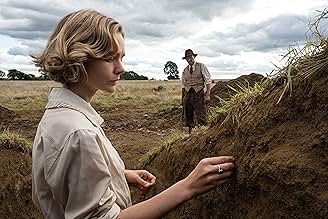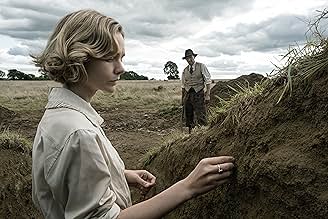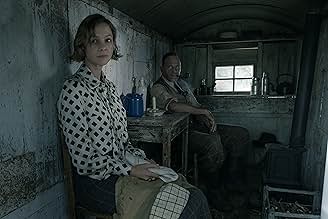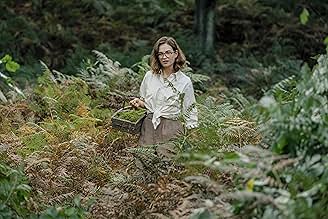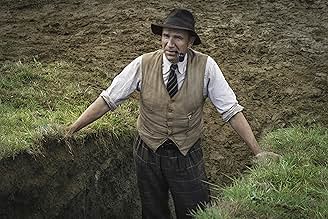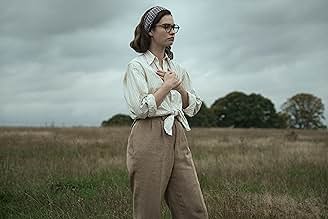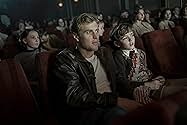Alle soglie della Seconda guerra mondiale, una ricca vedova chiede a un archeologo dilettante di occuparsi degli scavi di alcuni tumuli nella sua proprietà.Alle soglie della Seconda guerra mondiale, una ricca vedova chiede a un archeologo dilettante di occuparsi degli scavi di alcuni tumuli nella sua proprietà.Alle soglie della Seconda guerra mondiale, una ricca vedova chiede a un archeologo dilettante di occuparsi degli scavi di alcuni tumuli nella sua proprietà.
- Nominato ai 5 BAFTA Award
- 3 vittorie e 11 candidature totali
Recensioni in evidenza
An intriguing little piece of British history, The Dig tells a slow-burning story with understated and genuine drama throughout, turning what could have been a rather dry tale of archaeology into a genuinely gripping character drama. Its historical context takes a little while to become fully relevant, but ultimately, The Dig really proves itself as a captivating watch.
One of the things that I really liked about The Dig was its patience. Never dragging yet never rushing, the film takes its time to build up all of its main strengths, from its characters, their emotional back stories, and the overarching historical context of the outbreak of World War II.
Complete with elegant camerawork, a beautiful score and impressively atmospheric direction that makes it an eye-catching watch from the first few moments, The Dig has enough confidence and depth to keep you engrossed even if its story isn't advancing apace, something that's a lot harder to pull off than you may think.
One of the big reasons that the film's patient pacing and style work so well is because of its understated, genuine drama. With calm yet fully convincing performances across the board, particularly from Ralph Fiennes and Carey Mulligan, this isn't a showy period drama by any means, but eases you into a story about real people, making them the centre of attention far more than the historical significance of the event.
I'm not particularly well-versed in archaeology, and I didn't know about this discovery before watching this film. I think that might be the case for many other people, but the great thing about The Dig is that it's primarily a character-driven drama, and one that uses emotional intrigue to bring you closer to the story at hand and allow you to appreciate its importance.
One element where the film does seem to falter is in its use of the historical backdrop of the lead-up to World War II. Set in the summer months of 1939 before the outbreak of war, there are sporadic references to the coming conflict through the first two acts of the movie, but they don't seem to bear much relevance to this story about an archaeological find.
However, the film slowly begins to unveil how the historical context plays into its characters' personal lives and the fate of the dig itself, with dramatic focus shifting significantly in the final act, but just at the right point that the sudden arrival of the war into everyday life feels just like what it would have been like to experience it first-hand, taking over everything seemingly normal in an instant.
As a result, while the historical backdrop seems almost contrived at first, it really comes good as the film progresses, another demonstration of how the patience of The Dig really plays into its hands throughout.
One of the things that I really liked about The Dig was its patience. Never dragging yet never rushing, the film takes its time to build up all of its main strengths, from its characters, their emotional back stories, and the overarching historical context of the outbreak of World War II.
Complete with elegant camerawork, a beautiful score and impressively atmospheric direction that makes it an eye-catching watch from the first few moments, The Dig has enough confidence and depth to keep you engrossed even if its story isn't advancing apace, something that's a lot harder to pull off than you may think.
One of the big reasons that the film's patient pacing and style work so well is because of its understated, genuine drama. With calm yet fully convincing performances across the board, particularly from Ralph Fiennes and Carey Mulligan, this isn't a showy period drama by any means, but eases you into a story about real people, making them the centre of attention far more than the historical significance of the event.
I'm not particularly well-versed in archaeology, and I didn't know about this discovery before watching this film. I think that might be the case for many other people, but the great thing about The Dig is that it's primarily a character-driven drama, and one that uses emotional intrigue to bring you closer to the story at hand and allow you to appreciate its importance.
One element where the film does seem to falter is in its use of the historical backdrop of the lead-up to World War II. Set in the summer months of 1939 before the outbreak of war, there are sporadic references to the coming conflict through the first two acts of the movie, but they don't seem to bear much relevance to this story about an archaeological find.
However, the film slowly begins to unveil how the historical context plays into its characters' personal lives and the fate of the dig itself, with dramatic focus shifting significantly in the final act, but just at the right point that the sudden arrival of the war into everyday life feels just like what it would have been like to experience it first-hand, taking over everything seemingly normal in an instant.
As a result, while the historical backdrop seems almost contrived at first, it really comes good as the film progresses, another demonstration of how the patience of The Dig really plays into its hands throughout.
Honestly, I landed on the film last night, browsing titles on Netflix, because of Lily James - having known nothing else about the film from before (I usually skip trailers these days), but that she was in the cast was a huge draw for me - and found immense pleasure in this gem of a film. From Carey Mulligan and Ralph Fiennes to Ben Chaplin and Archie Barnes, the performances are all first-rate. The real-life story is told with great finesse, and filmed earnestly with a keen eye for production details. I have to say, even some of the lesser moments from the film shall stay with me for long, its appeal is that strong.
So rare to watch a wonderfully gentle but poignant film. It tugs at the emotions as it tells a largely true. Some liberties are taken with the truth but largely accurate. The real story of Peggy Piggott is fascinating and worth a film in itself. However the real stars of the story are Edith Pretty and Basil Brown portrayed brilliantly by Mulligan and Fiennes. One small criticism is that Carey Mulligan is too young for the part but she carries it off superbly and the performance by Ralph Fiennes is one of the best I have seen in a long time. The whole cast is superb and the backdrop of imminent war is ever present throughout the film. I have visited Sutton Hoo a number of times and studied the excavation and I still marvel at the work Basil Brown did. As an archaeologist myself I can say his work even by today's standards was of the highest order. Many of the academic archaeologists before and after WW2 were useless when it came to excavation and recording it. Basil Brown did everything right and it is fantastic he is at last getting the credit he deserved and that Edith Pretty wanted for him. It is to the great shame of the academic establishment it has taken so long. The film portrays this extremely well.
There are so many really good things about this movie, such a great piece of story telling.
The cast is excellent and all put in great performances, especially Lily James and Ralph Fiennes.
It's not just about an archaeological dig though, it's about past lives, present lives and how things are remembered in the future.
There are also several strands to the relationships between all invloved too, including working relationships, family relationships, class and secret relationships.
I don't know how much of the story is fiction or fact but it is well told either way. All this set with a backdrop of the coming second world war.
I am lucky enough to have seen the Sutton Hoo treasures at the British Museum and have always been keenly interested in archeology so this film based on the true story of this discovery was right up my street.
This is a very good movie..if you see the picture from the outside you'll say it's a story about an Archeologist and his historically important excavation..but if you dig deeper you'll find a lot of potential in what the movie is trying to tell you.
The relationships between us and the people we love,the people we don't even know..heck between people in general and how it's important to a human being..but that comes with a misunderstandings and conflicts and this happening in a time of war and how that is affecting them..all this has been told in an amazing dramatic way of Brasil Brown who discovered and excavated one of the most important archaeological discoveries of all time of course with that being the main story.
The acting by Carey Mulligan was magnificent and Ralph Fiennes was the one for this role and their performance was the outstanding thing in the whole movie.
Another thing was good is the editing..they've done a tremendous job and it was really worth the effort to come up with something like this.
Although sometimes there are some side stories that you'll find yourself not that interested in them too much,and the storytelling could seem very slow at some points..also there's ups and downs like any other movie.
Overall great movie,worth watching and i suggest you to see it.
Lo sapevi?
- QuizReimagines the events of the 1939 excavation of Sutton Hoo near Woodbridge, in Suffolk, England. It is the site of two early medieval cemeteries that date from the 6th to 7th centuries. One cemetery had an undisturbed ship burial with a wealth of Anglo-Saxon artifacts. Most of these objects are now held by the British Museum.
- BlooperEdith's son Robert can be seen wearing an aluminium foil hat early in the movie, Aluminium foil did not surface until after the war, but tin foil had existed since the 19th century.
- Citazioni
Basil Brown: Robert, we all fail. Every day. There are some things we just can't succeed at no matter how hard we try. I know it's not what you want to hear.
- ConnessioniFeatured in Jeremy Vine: Episodio #4.25 (2021)
- Colonne sonoreLa Rejouissance (Allegro)
Written by George Frideric Handel
Public Domain
Arranged by Julian Kershaw
Performed by Alder Valley Brass
I più visti
Accedi per valutare e creare un elenco di titoli salvati per ottenere consigli personalizzati
- How long is The Dig?Powered by Alexa
Dettagli
- Data di uscita
- Paesi di origine
- Sito ufficiale
- Lingua
- Celebre anche come
- La excavación
- Luoghi delle riprese
- Aziende produttrici
- Vedi altri crediti dell’azienda su IMDbPro
Botteghino
- Lordo in tutto il mondo
- 693 USD
- Tempo di esecuzione1 ora 52 minuti
- Colore
- Mix di suoni
- Proporzioni
- 2.00 : 1
Contribuisci a questa pagina
Suggerisci una modifica o aggiungi i contenuti mancanti







